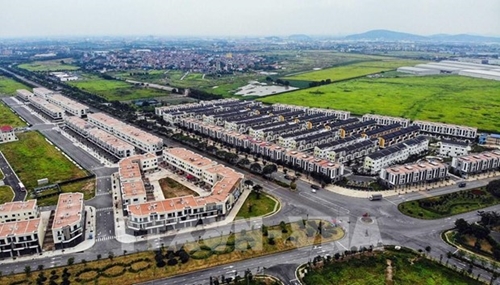The Southeast Asian nation has witnessed a wave of foreign manufacturers shifting production to Vietnam's shores over the past year, which is expected to rise.
The Danish toy production company LEGO Group poured 1 billion USD to build a manufacturing plant in the southern province of Binh Duong last year. The project, which has a total investment of more than 1 billion USD, is expected to become operational by 2024, creating about 4,000 jobs.
The Republic of Korea’s electronics giant Samsung has announced plans to increase its investment in Vietnam to 20 billion USD, focusing on artificial intelligence, big data and other areas.
    |
 |
|
Room for industrial real estate development remains high due to short supply. (Photo for illustration) |
LG Corporation is planning to invest 4 billion USD in Vietnam with the goal of making the country a future smartphone manufacturing hub.
According to experts, investment in industrial zones (IZ) in Vietnam is attractive for several reasons. Firstly, the Vietnamese dong has undergone a lower depreciation than the currencies in the region such as Indonesia, Thailand, India and Malaysia.
Vietnamese investment policies are also a factor. To attract more investors, Vietnam has offered many incentives including corporate income tax exemptions for the first four years of operation, reducing corporate income tax by a half in the next five years and other preferential policies.
The rental price for industrial land in Vietnam, which is about 30-36% lower than that in Indonesia and Thailand, is another advantage, they said.
A survey by Colliers, a leading real estate professional services and investment management company, showed that the average rent for land in Indonesia’s industrial parks such as Tangerang, Bogor-Sukabumi and Bekasi is 164 USD per square meter, 36% higher than that in industrial hubs in Vietnam like Binh Duong, Dong Nai, Bac Ninh, and Hai Phong.
The rental price for industrial land is expected to rise when new industrial parks are put into operation. However, insiders said that there will be a scarcity in the supply of this kind of real estate this year.
They attributed this to difficulties in site clearance and legal obstacles in converting rubber plantation land to industrial park land in many localities.
The strict control of agricultural land conversion in line with the Government’s Resolution No.115/NQ-CP is also a problem. This is an important part of the national land use plan for the 2021-2025 period.
Source: VNA